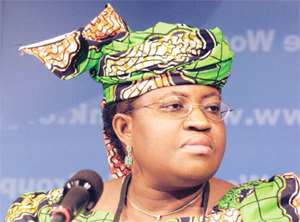
World Bank Managing Director, Ngozi Okonjo-Iweala, resigned her post on Friday in order to become Nigeria's new finance minister, spurring hopes of reform in sub-Saharan Africa's second biggest economy.
Okonjo-Iweala will take up an expanded position as Co-coordinating Minister for the Economy and Minister of Finance in Nigerian President Goodluck Jonathan's new cabinet, World Bank President, Robert Zoellick said in a statement.
'Her desire to serve her country is truly a big loss for the World Bank but a major gain for Nigeria as it works to craft its economic way forward,' he said.
Jonathan was sworn in for his first full term on May 29 following general elections and his ministerial choices are being closely watched by Nigerians and foreign investors who want a team capable of driving badly needed reforms.
'We think President Goodluck Jonathan's selection of the World Bank MD will result in a vote of confidence for his administration, and suggests he is serious about initiating fiscal reforms,' Renaissance Capital said in a research note.
Okonjo-Iweala laid out her vision for the Nigerian economy during her screening by the Senate last week, pledging to create jobs and ensure the country 'lives within its means' if approved as a cabinet minister.
Jonathan swore 17 other ministers into office on Friday including outgoing Finance Minister Olusegun Aganga, who is expected to be put in charge of a newly-expanded commerce and investment portfolio, presidency sources said.
The inclusion of Okonjo-Iweala in the cabinet could lend more weight to his reform ambitions, although skeptics question whether she will have the full political backing she needs.
'As a reformist, her reputation speaks for itself,' said Razia Khan, head of Africa research at Standard Chartered.
Ngozi's contribution as Managing Director has been stellar, Robert Zoellick, World Bank President said. In her time as Managing Director, Ngozi was determined to work in the interest of poor people in developing countries around the globe.
'We are truly proud that Ngozi is choosing to support her country in this way. Nigeria is fortunate to have someone of Ngozi's stature,' Zoellick added.
Along with her role of special oversight for the Bank's work in Africa, Eastern Europe and Central Asia, South Asia, Okonjo-Iweala also played a pivotal role in overseeing the Bank's continuing work to help countries adversely impacted by high and volatile food prices effectively managing the Bank's own food crisis fund which has helped more than 40 million people in 44 countries.
Okonjo-Iweala skillfully and successfully chaired the latest round of replenishment for the Bank's fund for the world's poorest countries and the International Development Association (IDA) helped to raise a record $49.3 billion.
Okonjo-Iweala is internationally recognized for her role as a strong advocate of gender issues. Her creativity has led to the development of initiatives in the World Bank for the recovery of stolen assets and South-South co-operation.
Prior to accepting the position of Managing Director at the World Bank in 2007, Okonjo-Iweala was a Distinguished Visiting Fellow at the Brookings Institution, Washington, D.C. From July 2003 to June 2006, she served as Finance Minister of Nigeria and later, Foreign Affairs Minister.
As Minister of Finance, she spearheaded negotiations with the Paris Club of Creditors in 2005 that led to the wiping out of $30 billion of Nigerians external debt, including outright cancellation of $18 billion.
She built a reputation as a corruption fighter and opened the government finances to public scrutiny by publishing federal monthly financial allocations to the states and local governments in the newspapers.
Previously she had a 21-year career as a development economist at the World Bank, working in a number of different capacities. She served as country director in the East Asia region, director of operations in the Middle East and Vice President and Corporate Secretary.
From Business Desk




 Former Kotoko Player George Asare elected SRC President at PUG Law Faculty
Former Kotoko Player George Asare elected SRC President at PUG Law Faculty
 2024 elections: Consider ‘dumsor’ when casting your votes; NPP deserves less — P...
2024 elections: Consider ‘dumsor’ when casting your votes; NPP deserves less — P...
 You have no grounds to call Mahama incompetent; you’ve failed — Prof. Marfo blas...
You have no grounds to call Mahama incompetent; you’ve failed — Prof. Marfo blas...
 2024 elections: NPP creates better policies for people like us; we’ll vote for B...
2024 elections: NPP creates better policies for people like us; we’ll vote for B...
 Don’t exchange your life for wealth; a sparkle of fire can be your end — Gender ...
Don’t exchange your life for wealth; a sparkle of fire can be your end — Gender ...
 Ghana’s newly installed Poland train reportedly involved in accident while on a ...
Ghana’s newly installed Poland train reportedly involved in accident while on a ...
 Chieftaincy disputes: Government imposes 4pm to 7am curfew on Sampa township
Chieftaincy disputes: Government imposes 4pm to 7am curfew on Sampa township
 Franklin Cudjoe fumes at unaccountable wasteful executive living large at the ex...
Franklin Cudjoe fumes at unaccountable wasteful executive living large at the ex...
 I'll 'stoop too low' for votes; I'm never moved by your propaganda — Oquaye Jnr ...
I'll 'stoop too low' for votes; I'm never moved by your propaganda — Oquaye Jnr ...
 Kumasi Thermal Plant commissioning: I pray God opens the eyes of leaders who don...
Kumasi Thermal Plant commissioning: I pray God opens the eyes of leaders who don...
